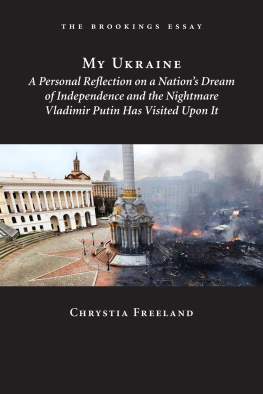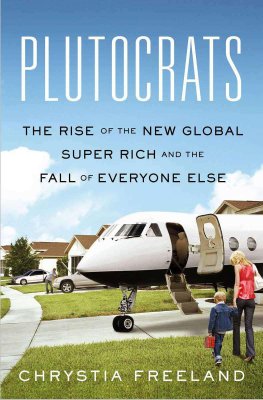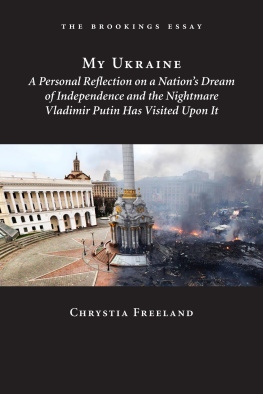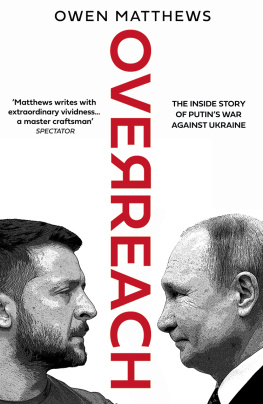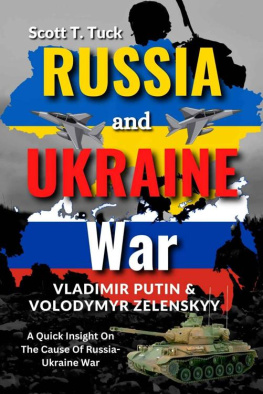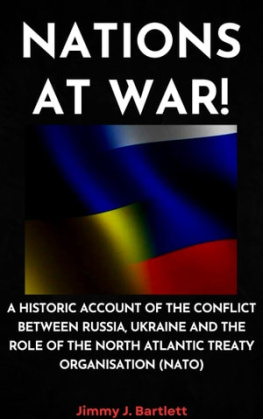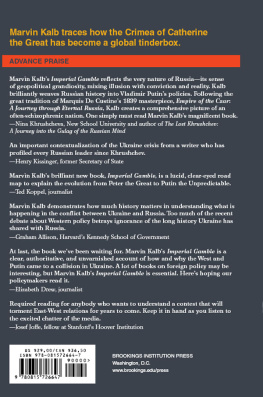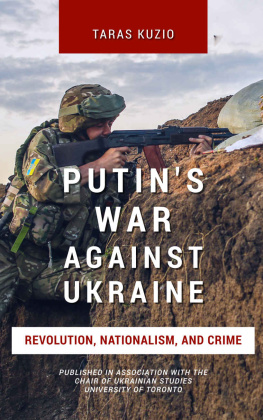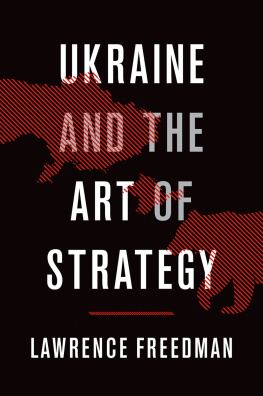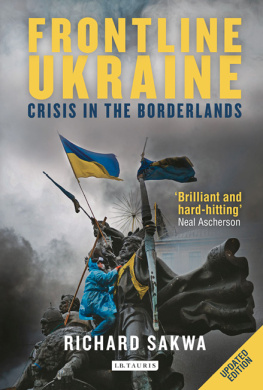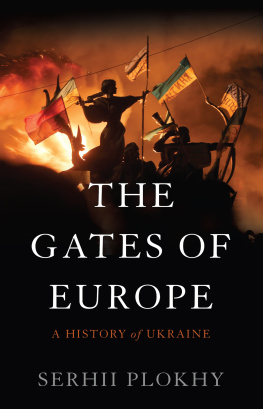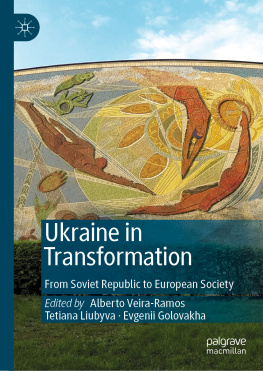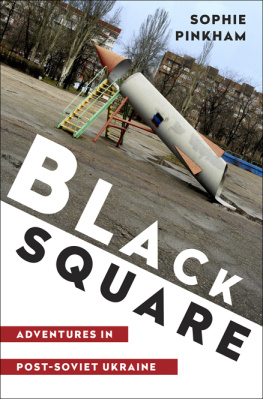This essay is available for Kindle and other e-book formats. Other Brookings essays available as e-books include:
Join the conversation on Twitter using #BrookingsEssay or share this on Facebook. We invite you to explore all of the Brookings essays at thebrookingsessay.org
May 2015
On March 24 last year, I was in my Toronto kitchen preparing school lunches for my kids when I learned from my Twitter feed that I had been put on the Kremlins list of Westerners who were banned from Russia. This was part of Russias retaliation for the sanctions the United States and its allies had slapped on Vladimir Putins associates after his military intervention in Ukraine.
Four days earlier, nine people from the U.S. had been similarly blacklisted, including John Boehner, the speaker of the House of Representatives, Harry Reid, then the majority leader of the Senate, and three other senators: John McCain, a long-time critic of Putin, Mary Landrieu of Louisiana, and Dan Coats of Indiana, a former U.S. ambassador to Germany. "While I'm disappointed that I won't be able to go on vacation with my family in Siberia this summer, Coats wisecracked, I am honored to be on this list."
I, however, was genuinely sad. I think of myself as a Russophile. I speak the language and studied the nations literature and history in college. I loved living in Moscow in the mid-nineties as bureau chief for The Financial Times and have made a point of returning regularly over the subsequent fifteen years.
Im also a proud member of the Ukrainian-Canadian community. My maternal grandparents fled western Ukraine after Hitler and Stalin signed their non-aggression pact in 1939. They never dared to go back, but they stayed in close touch with their brothers and sisters and their families, who remained behind. For the rest of my grandparents lives, they saw themselves as political exiles with a responsibility to keep alive the idea of an independent Ukraine, which had last existed, briefly, during and after the chaos of the 1917 Russian Revolution. That dream persisted into the next generation, and in some cases the generation after that.
My late mother moved back to her parents homeland in the 1990s when Ukraine and Russia, along with the thirteen other former Soviet republics, became independent states. Drawing on her experience as a lawyer in Canada, she served as executive officer of the Ukrainian Legal Foundation, an NGO she helped to found.
My mother was born in a refugee camp in Germany before the family immigrated to western Canada. They were able to get visas thanks to my grandfathers older sister, who had immigrated between the wars. Her generation, and an earlier wave of Ukrainian settlers, had been actively recruited by successive Canadian governments keen to populate the vast prairies of Manitoba, Saskatchewan, and Alberta.
Today, Canadas Ukrainian community, which is 1.25 million-strong, is significantly larger as a percentage of total population than the one in the United States, which is why it is also a far more significant political force. And that in turn probably accounts for the fact that while there were no Ukrainian-Americans on the Kremlins blacklist, four of the thirteen Canadians singled out were of Ukrainian extraction: in addition to myself, my fellow Member of Parliament James Bezan, Senator Raynell Andreychuk, and Paul Grod, who has no national elective role, but is head of the Ukrainian Canadian Congress.
I made the Russian list of the unwelcome as a three-fer: an activist Ukrainian-Canadian, a politician (I was elected to Parliament in 2013 to represent Toronto Centre), and a journalist with a long paper trail that frequently displeased the Kremlin, since I covered Moscows brutal war in Chechnya in the 1990s and also wrote a book about the rise of the Russian oligarchs. I interviewed Putin himself in 2000, shortly after he took over as president. When, in 2011, he decided to take the presidency back from his protg, Dmitry Medvedev, I wrote a column in The New York Times arguing that Putins Russia was on its way to becoming a full-fledged dictatorship that would eventually be vulnerable to a popular uprising.
Until March of last year, none of this prevented my getting a Russian visa. I was, on several occasions, invited to moderate panels at the St. Petersburg International Economic Forum, the Kremlins version of the World Economic Forum in Davos. Then, in 2013, Medvedev agreed to let me interview him in an off-the-record briefing for media leaders at the real Davos annual meeting.
That turned out to be the last year when Russia, despite its leaderships increasingly despotic and xenophobic tendencies, was still, along with the major Western democracies and Japan, a member in good standing of the G-8. Russia in those days was also part of the elite global group Goldman Sachs had dubbed the BRICsthe acronym stands for Brazil, Russia, India, and Chinathe emerging market powerhouses that were expected to drive the world economy forward. Putin was counting on the $50 billion extravaganza of the 2014 Sochi Winter Olympics to further solidify Russias position at the high table of the international community.
President Viktor Yanukovychs flight from Ukraine in the face of the Maidan uprising, which took place on the eve of the closing day of those Winter Games, astonished and enraged Putin. In his pique, as Putin proudly recalled in a March 2015 Russian government television film, he responded by ordering the takeover of Crimea after an all-night meeting. That occurred at dawn on the morning of February 23, 2014, the finale of the Sochi Olympics. The war of aggression, occupation, and annexation that followed turned out to be the grim beginning of a new era, and what might be the start of a new cold war, or worse.
Putins Big Lie
The crisis that burst into the news a year-and-a-half ago has often been explained as Putins exploitation of divisions between the mainly Russian-speaking majority of Ukrainians in the eastern and southern regions of the country, and the mainly Ukrainian-speaking majority in the west and center. Russian is roughly as different from Ukrainian as Spanish is from Italian.
While the linguistic factor is real, it is often oversimplified in several respects: Russian-speakers are by no means all pro-Putin or secessionist; Russian- and Ukrainian-speakers are geographically commingled; and virtually everyone in Ukraine has at least a passive understanding of both languages. To make matters more complicated, Russian is the first language of many ethnic Ukrainians, who are 78 percent of the population (but even that category is blurry, because many people in Ukraine have both Ukrainian and Russian roots). President Petro Poroshenko is an examplehe always understood Ukrainian, but learned to speak it only in 1996, after being elected to Parliament; and Russian remains the domestic language of the Poroshenko family. The same is true in the home of Arseniy Yatsenyuk, Ukraines prime minister. The best literary account of the Maidan uprising to date was written in Russian: Ukraine Diaries, by Andrey Kurkov, the Russian-born, ethnic Russian novelist, who lives in Kyiv.

